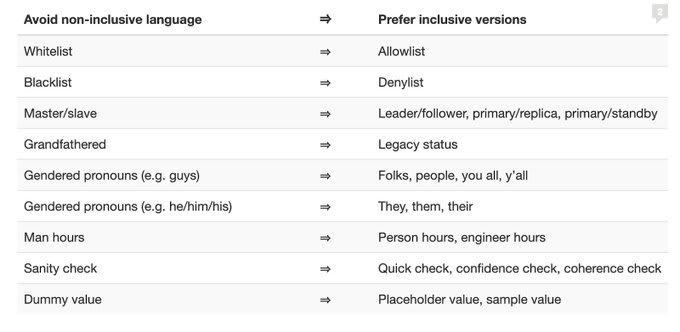Twitter recently announced that they’re beginning to change many of the words they use, to “more inclusive” variants.They announced this on twitter. Which of course meant everyone wanted to fight about it.
How much of this is just white silicon valley folks changing words they think are offensive? Is this cancel culture just with words? Does this actually matter or is it just virtue signalling?
 The words twitter are changing, and what they're changing them to.
The words twitter are changing, and what they're changing them to.
Honestly I’m not sure how much the inclusive language matters in regards to minorities. I haven’t heard many members of actual minority groups say that this matters to them.But considering that tech has a huge diversity problem, perhaps this isn’t so surprising - there aren’t that many people to speak up.
So let’s sidestep that discussion for a moment, and talk about another argument for making these changes. Most of the new terms are better!
At least if you don’t know the old ones already. People naturally prefer the terms they’re used to, because things we’re used to seem natural and right.
But I think if you’re just getting into tech, many of the new terms are better. They’re more self-explanatory and descriptive:
Blacklists and Denylists
Using blacklist and whitelist have the advantages of piggybacking on “regular” english words.But we’re creating technical terms here, so we don’t have to use existing words, if a better alternative exist.Using allowlist and denylist have some wonderful advantages. They’re self-contained and very explicit. The first time you read about an allowlist, you know exactly what it does.
Masters or Leaders
I particularly like changing the master/slave terminology to something that’s more nuanced. Often it seems like every relationshipwhere there’s a primary (or master) instance, we describe it as a master/slave relationship.But we can do better than that. If we describe it as primary/standby, we get extra information. There’s a primary instance, and the role of the follower instance is to be a standby in case of errors.Changing master/slave means that we get to use much more expressive terminology.
Dummies vs. Placeholders
I think placeholder value is a much better term than dummy value. It’s much more explicit.
You might think dummy value is pretty explicit already - but I’d argue it’s not.As an international developer, I had no idea that you could “dummy up” something fake.I knew that dummy could mean something that resembled the real thing, but I’d never made the connection betweenthat and dummy value.
It was just one of those terms I used because that’s what we call it._Contrast that with placeholder value - which says _exactly what it is.
A lot of these new words meet resistance. Partly because they’re new, and partly because people disagree on whether or not they’re racist, and if it matters.
I think we should try to keep the broader picture in mind.Generations of people are going to have to learn these terms and use these words in the future. We owe it to them to pick the best damn ones.
Even if it does inconvenience us slightly.


Top comments (0)